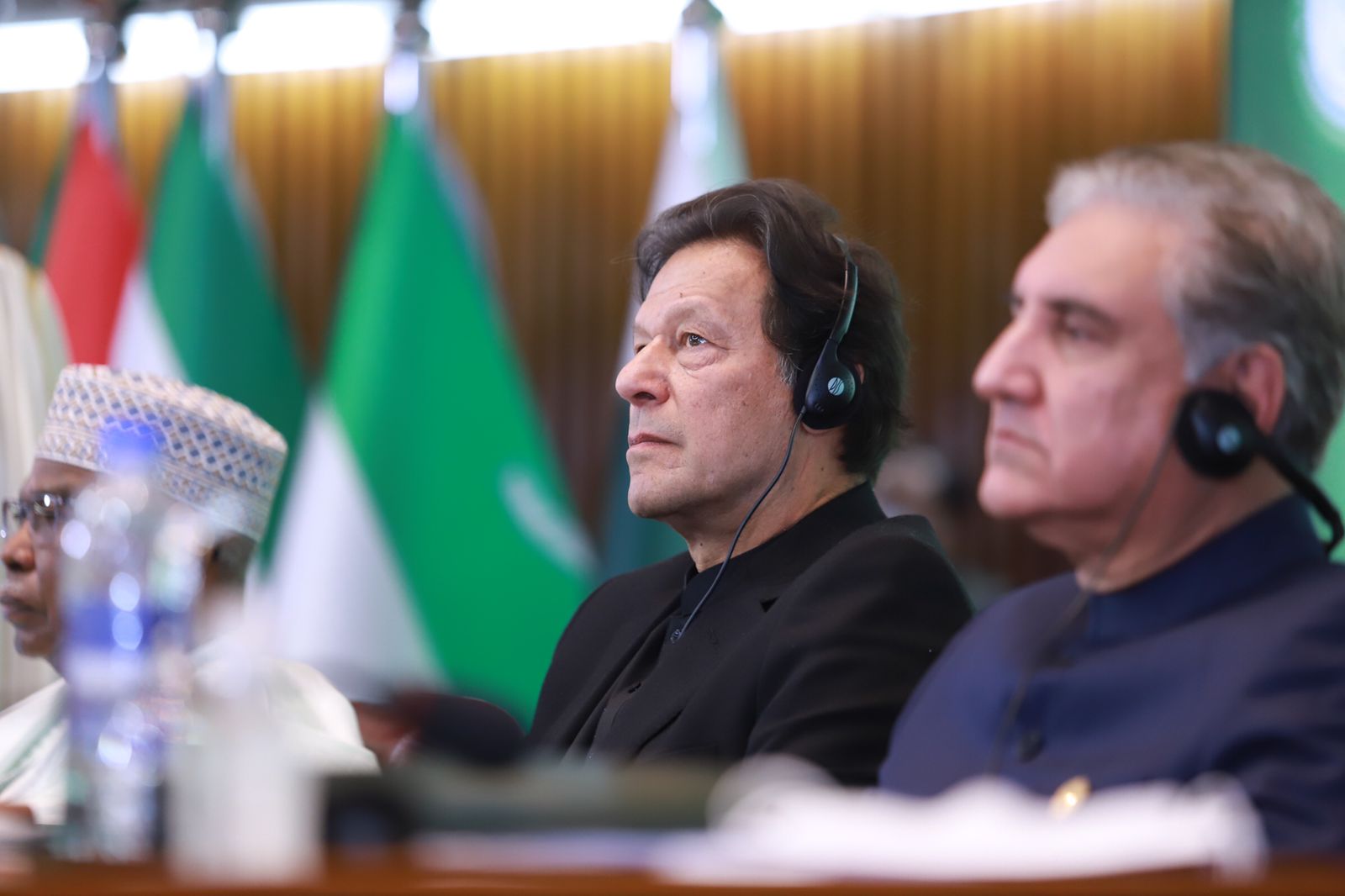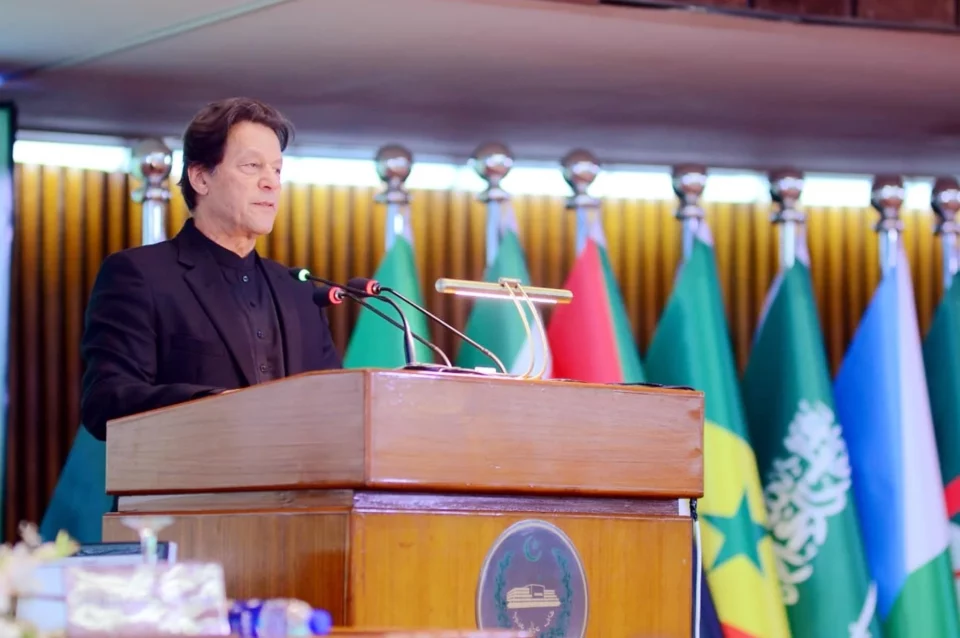PM Imran Khan says US must delink rights issues from assistance, stresses on inclusive government in Afghanistan to pave way for international aid
ISLAMABAD: Prime Minister Imran Khan has called for devising an immediate medium and long term strategy to address the dire humanitarian situation in Afghanistan, warning any chaos there will not be in anybody’s interest.
Addressing the inaugural session of the 17th extraordinary session of the Organisation of Islamic Cooperation (OIC) Council of Foreign Ministers on Sunday, the prime minister said that he is impressed with the Islamic Development Bank’s suggestions of medium and long term measures to help the Afghan people and make their economy sustainable.
The prime minister warned that Afghanistan is heading for chaos and the biggest man made crisis is unfolding there which needs immediate action on behalf of the international community especially the OIC, the United Nations, the United States and the European Union.
Highlighting the collapsing hospitals, education sector, and the deteriorating humanitarian situation in Afghanistan, the prime minister called for the world to take immediate action as Afghanistan is heading towards chaos.
“Unless action is taken immediately, Afghanistan is heading for chaos. When it cannot pay salaries to public servants, doctors and nurses, any government is going to collapse. But chaos suits no one. It certainly does not suit the United States,” he added.
The prime minister said ironically, Pakistan had hosted the OIC moot on Afghanistan 41 years ago as no country suffered from conflicts as much as Afghanistan. He said the situation in Afghanistan is also caused by years of a corrupt government, suspension of foreign aid, freezing of foreign assets and a dysfunctional banking system which can lead to the collapse of any state.

The prime minister said, “The big responsibility rests with the OIC countries as it is our religious duty to help the Afghan people.” He said the United States must delink the issues of human rights from humanitarian assistance.
He said, “We are already late in extending help to the Afghan people as the harsh winter season has already set in.” He said this is also a country which has been affected by the breakout of Covid-19.
The prime minister said that the Taliban would also have to understand that formation of an inclusive government, respect for human rights, particularly women, and disallowing the use of Afghan soil for terrorism in other countries would pave the way for international aid to Afghanistan.
The prime minister, however, asked the international community to be sensitive to the cultural traditions of Afghanistan as well as adjoining areas in Pakistan, particularly considering girls’ education. He said in case of violation of their traditions, the families would never send their girls to schools even if incentivised, but they would willingly do it without any stipend if they feel satisfied.
Imran Khan pointed out that forty years of conflict coupled with prolonged drought, years of corrupt governance, dried up foreign aid and freezing of the banking system has aggravated the situation in the country.
He said any country in such a situation will collapse. He said such a situation will have serious consequences including mass exodus of refugees. He pointed out that Pakistan is already hosting millions of Afghan refugees and it cannot deal with more influx of refugees.
The premier said the threat of terrorism from ISIL can only be tackled effectively through a stable government in Afghanistan. He said that Pakistan has faced terror attacks from the terrorist outfit. He said this organisation will continue to pose a serious threat if the Afghan government does not have the capability to fight it.
On Palestine and Kashmir issues, the prime minister said the people of these territories want to see a unified response from the Muslim world about their democratic and human rights.
Regarding Islamophobia, the prime minister said the OIC must play its role to help the world understand the teachings of Islam and Muslims’ love and affection for the last Prophet Hazrat Muhammad (Peace Be Upon Him). TLTP
Six-point framework
In his welcome address during the 17th extraordinary session of the OIC Council of Foreign Ministers, the Pakistani Foreign Minister Shah Mahmood Qureshi has proposed a six-point framework to support the Afghan people.
“We should create a vehicle within the OIC to channel immediate and sustained humanitarian and financial support to the Afghan people including the pledges from the OIC and other donors,” Qureshi said.
He said, “We should agree to increase investment for the Afghan people bilaterally or through the OIC in areas such as education, health, technical and vocational skills to the Afghan youth.”
He suggested that a group of experts comprising the OIC, the UN and international financial institutions be established to consider ways and means to facilitate Afghan access to the legitimate banking system and ease the liquidity challenge of Afghan people.
“We should focus on enhancing food security for the Afghan people and the Islamic organisation of food security must lead this effort.”
Qureshi said, “We should engage with the Afghan authorities to help meet the expectations of the international community regarding political and social inclusivity, respect for human rights especially of women and girls and combating terrorism.”
Alluding to the dire humanitarian situation in Afghanistan and threat of economic meltdown there, the foreign minister said this is a moment to extend a collective helping hand and not to withhold support. He said that Pakistan concurred with the United Nations Secretary General that the humanitarian assistance be provided without conditions.
He said the gathering of OIC leaders at short notice also reaffirmed their commitment to address the humanitarian situation in Afghanistan. Calling it a matter of survival, the foreign minister said over half of the Afghan population faced food shortage, which made the population of two-thirds UN member states.
He said Pakistan had hosted an OIC session on Afghanistan in 1980 and after 41 years, Pakistan was obliged to host another session on the humanitarian crisis in the same country as the sufferings of the Afghan people had not ended.
Qureshi referred to the World Food Programme, which warned that Afghanistan could face the largest humanitarian crisis in the world and the United Nations also warned of a similar situation. He said it is a moment to stand up and that the Afghan people must be supported without any condition.
Afghan economy in ‘free fall’
On the other hand, UN Emergency Relief Coordinator has said that Afghanistan’s economy is in “free fall”, warning if decisive and compassionate action is not taken immediately, it may “pull the entire population with it”.
Speaking virtually to the 17th session of the OIC Council of Foreign Ministers, Under-Secretary-General for Humanitarian Affairs Martin Griffiths painted a grim picture of 23 million people facing hunger; malnourished children overflowing in health facilities; 70 percent of teachers working without salaries; and millions of students – Afghanistan’s future – out of school.
Moreover, this is occurring as the value of the Afghani currency plummets, a lack of confidence in the financial sector destroys trade and the space for borrowing and investment dramatically constricts.
“The need for liquidity and stabilization of the banking system is now urgent – not only to save the lives of the Afghan people but also to enable humanitarian organizations to respond”, he said.
The UN official welcomed the decision by the World Bank’s Afghanistan Reconstruction Trust Fund to transfer $280 million by the end of December to the UN Children’s Fund (UNICEF) and the World Food Programme (WFP). “This step should be followed by reprogramming of the whole fund to support the Afghan people this winter”, he said.
“Families simply do not have the cash for everyday transactions, while prices for key commodities continue to rise”. The cost of wheat and fuel are up by around 40 per cent and food now accounts for more than 80 per cent of the average household expenditure. And as international development support has frozen up, basic social services that all Afghans depend on are collapsing.
Griffiths cautioned that by the middle of next year, universal poverty – reaching 97 per cent of the population – could be “the next grim milestone”.
“Within a year, 30 percent of Afghanistan’s gross domestic product could be lost altogether, while male unemployment may double to 29 percent”, he spelled out.
The OIC met to express their willingness to help avert disaster and contribute to the humanitarian endeavour. “The United Nations stands firmly with you, and in solidarity with the people of Afghanistan”, said the Relief Coordinator, explaining that next year, the UN would seek its largest-ever funding appeal of $4.5 billion “to help the most vulnerable in Afghanistan”.
The plan is a stopgap measure for over 21 million people who need life saving assistance and must be funded as “a matter of priority”.
“The crisis is huge. Our humanitarian response is effective and continues to scale up, thanks to generous donor support and your sustained engagement”, he stated.
Afghanistan will not get through the winter on emergency aid alone, the UN official flagged, stressing the need for “flexible donor funding” that can be used to ensure salaries for public sector workers and support to basic services, such as health, education, electricity and livelihood. And going forward, continued constructive engagement with the de facto authorities is imperative to “clarify what we expect of each other”.
“The consequences of inaction on these three fronts are clear: Afghanistan will collapse, people will run out of hope, and the region – and indeed the world – will see destabilization increase”, he underscored.


